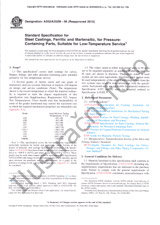Potřebujeme váš souhlas k využití jednotlivých dat, aby se vám mimo jiné mohly ukazovat informace týkající se vašich zájmů. Souhlas udělíte kliknutím na tlačítko „OK“.
Informace o normě:
Označení normy: ASTM D1687-17
Poznámka: NEPLATNÁ
Datum vydání normy: 1.6.2017
Kód zboží: NS-688033
Počet stran: 10
Přibližná hmotnost: 30 g (0.07 liber)
Země: Americká technická norma
Kategorie: Technické normy ASTM
Kategorie - podobné normy:
Anotace textu normy ASTM D1687-17 :
Keywords:
atomic absorption, chromium, graphite furnace, hexavalent chromium, photometric, water,, ICS Number Code 13.060.50 (Examination of water for chemical substances)
Doplňující informace
| Significance and Use | ||||||||||||||||||||||||||||||||||||||||
|
4.1 Hexavalent chromium salts are used extensively in metal finishing and plating applications, in anodizing aluminum, and in the manufacture of paints, dyes, explosives, and ceramics. Trivalent chromium salts are used as mordants in textile dyeing, in the ceramic and glass industry, in the leather industry as a tanning agent, and in photography. Chromium may be present in wastewater from these industries and may also be discharged from chromate-treated cooling waters. 4.2 The hexavalent state of chromium is toxic to humans, animals, and aquatic life. It can produce lung tumors when inhaled and readily induces skin sensitization. |
||||||||||||||||||||||||||||||||||||||||
| 1. Scope | ||||||||||||||||||||||||||||||||||||||||
|
1.1 These test methods cover the determination of hexavalent and total chromium in water. Section 34 on Quality Control pertains to these test methods. Three test methods are included as follows:
1.2 Test Method A is a photometric method that measures dissolved hexavalent chromium only. Hexavalent chromium can also be determined by ion chromatography, see Test Method D5257. Test Methods B and C are atomic absorption methods that are generally applicable to the determination of dissolved or total recoverable chromium in water without regard to valence state. ICP-MS or ICP-AES may also be appropriate but at a higher instrument cost. See Test Methods D5673 and D1976. 1.3 Test Method A has been used successfully with reagent grade water Types I, II, and III, tap water, 10 % NaCl solution, treated water from a synthetic organic industrial plant that meets National Pollution Discharge Elimination System (NPDES) permit requirements, and EPA-extraction procedure leachate water, process water, lake water, effluent treatment, that is, lime neutralization and precipitation of spent pickle liquor and associated rinse water from stainless steel pickling. Test Method C has been used successfully with reagent water, stock scrubber water, lake water, filtered tap water, river water, well water, production plant water, and a condensate from a medium BTU coal gasification process. Matrices used, except for reagent water, are not available for Test Method B. It is the user's responsibility to ensure the validity of these test methods for waters of untested matrices. 1.4 The values stated in SI units are to be regarded as standard. The values given in parentheses are mathematical conversion to inch-pound units that are provided for information only and are not considered standard. 1.5 This standard does not purport to address all of the safety concerns, if any, associated with its use. It is the responsibility of the user of this standard to establish appropriate safety and health practices and determine the applicability of regulatory limitations prior to use. For specific hazard statements, see 4.2, 20.3, and 20.8.1. 1.6 This international standard was developed in accordance with internationally recognized principles on standardization established in the Decision on Principles for the Development of International Standards, Guides and Recommendations issued by the World Trade Organization Technical Barriers to Trade (TBT) Committee. |
||||||||||||||||||||||||||||||||||||||||
| 2. Referenced Documents | ||||||||||||||||||||||||||||||||||||||||
|
Doporučujeme:
Aktualizace zákonů
Chcete mít jistotu o platnosti užívaných předpisů?
Nabízíme Vám řešení, abyste mohli používat stále platné (aktuální) legislativní předpisy.
Chcete vědět více informací? Podívejte se na tuto stránku.




 Cookies
Cookies
